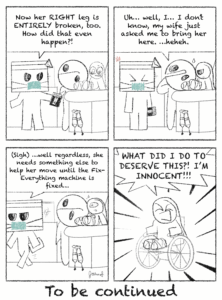Oxytocin is a chemical affectionately referred to as “the love hormone.” However, that title is a bit misleading: it’s not a love potion, of course. After all, if love were as simple as neurochemistry, we at UR would be all paired up and atwitter with love.
It’s called “the love hormone” because its naturally occurring levels spike during childbirth, breast-feeding, and sex, inspiring feelings of trust between mother and child or between partners.
Oxytocin also has other purposes, including reducing anxiety and increasing social memory. One study has even correlated increased oxytocin levels with faster wound healing. It might as well be just a little dose of super-hero, and in this high-stress environment known as college, we could all use a little bit of super-hero.
Of course, it’s not that interesting just knowing that our bodies contain this nice little chemical that is making good things happen inside us. Maybe it would be more useful if we could just chat up our brains and say, “Hey, Brain! Pituitary, I’m looking at you. Could you hook me up with a bit more of that oxytocin stuff?”
That said, naturally occurring oxytocin levels are affected by certain behaviors, namely sex. And not just intercourse sex, but sexual arousal in general.For men, oxytocin levels rise throughout any period of sexual arousal.
For women, the hormone levels only rise a bit until orgasm, after which there is a true spike of oxytocin. For all those of you in relationships with women, go ahead and take that as a motivation to give your lady a little special attention! And for those without a partner, don’t you worry because a little special attention from yourself *wink, wink* works too.
That said, oxytocin is really best at one thing – bonding. It promotes trust, closeness, and feelings of safety associated with your partner.
Interestingly, one study administered an oxytocin nasal spray to men and showed that those who were in monogamous relationships, on average, sat about a half a foot farther away from an “attractive woman” on a bench than the men who weren’t in relationships.
So any of you out there worrying that your partner is straying from you, remember that sex will help you trust them and ease your anxiety while simultaneously promoting monogamy between you two.
To those of you without partners, no worries, your brain is smart.Even with all this talk about how oxytocin increases trust, a recent study found that trust was only increased if the subject didn’t already have a reason to distrust their partner.
Oxytocin works selectively and intelligently. Too much “me-time” isn’t going to make you fall in love with your hand, and it won’t have wonky effects that make it harder to find someone you want to date.
Really, no matter who you are or whether you’re in a relationship or single, just remember: sex (not just intercourse) increases oxytocin, and oxytocin feels good. So when exams come around and you’re feeling anxious, just hop on your beau or warm up your hand and get at it.
Armstrong is a member of the class of 2016.

